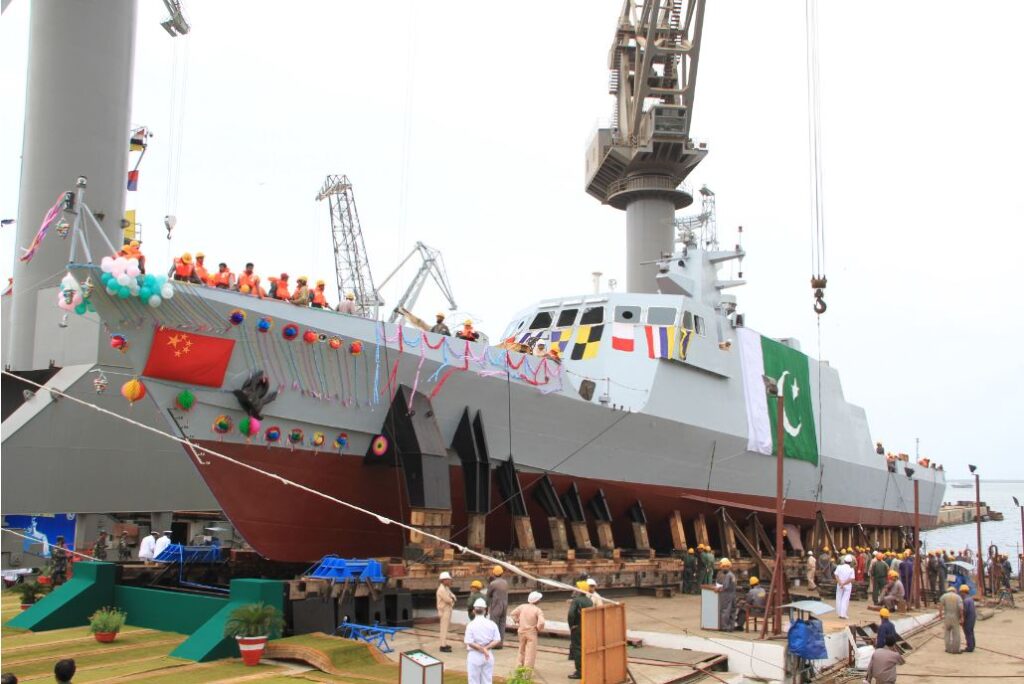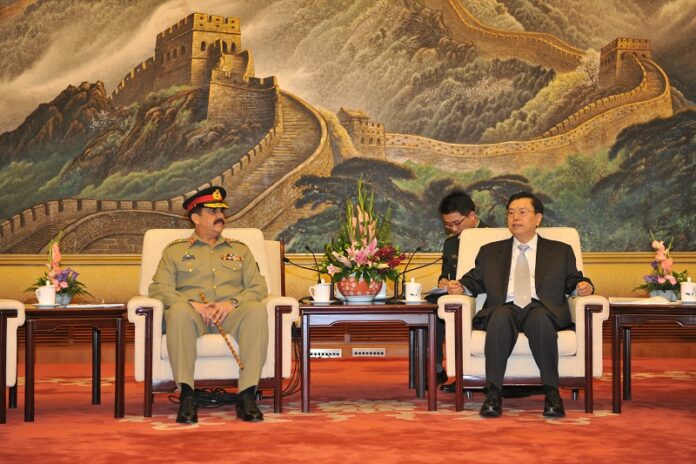Military ties between the two strategic partners, Pakistan and China are on the rise. Both countries are extending military cooperation in many diversified fields of human resource management, training, joint military and air force exercise, infrastructure, joint ventures and Transfer of Technology.
On the invitation of Chinese defence authorities, Chief of Army Staff (COAS) General Raheel Sharif officially visited China and held a meeting with Mr. Wang Yi, the Foreign Minister of China in which matters of mutual interests were discussed. Later, the COAS visited Peoples Liberation Army (PLA) Headquarters where he was received by General Hou Shushen, Deputy Chief of General Staff PLA and reviewed a smartly turned out guard of honour. Both military leaders held a one on one meeting which covered wide range of issues with focus on bilateral military cooperation. It was General Sharif’s first ever visit to China since he assumed the command of Pakistan’s military last year.
Keeping in view the different emerging socio-economic, geo-political and geo-strategic trends in and beyond the region, the COAS visit was significant during which new defence pacts were also signed between the two strategic partners.
The interaction during the different meetings with high officials encompassed Pak-China relations, with particular emphasis on defence and security cooperation. Pakistan and China enjoy close military and defence ties and both countries have recently conducted joint military and air exercises that has further cemented their strong relation.
The Vice Chairman of China’s Central Military Commission Fan Changlong also met with Gen Raheel Sharif; calling Pakistan a “true friend” of China, Fan said the development of bilateral “all-weather friendship” is the common option of the two peoples. Pakistan’s strong support for China in combating terrorists of the East Turkestan Islamic Movement (ETIM) was also appreciated by Fan who also called on the two sides to further strengthen counter-terrorism cooperation. Fan said the People’s Liberation Army (PLA) is willing to enhance concrete and long-term exchanges and cooperation with the Pakistani army.
Echoing Fan’s remarks on bilateral ties, Sharif said Pakistan firmly supported China on major issues regarding China’s core interests. The ETIM is the common enemy of the two countries, Sharif said, adding Pakistan will spare no efforts to crack down on it.
Extended Cooperation against Terrorism
Chinese security official Meng Jianzhu also pledged to strengthen cooperation against terrorism with Pakistan and protect the security of Chinese personnel and institutions in Pakistan. Meng, head of the Commission for Political and Legal Affairs of the Communist Party of China (CPC) Central Committee and a member of the Political Bureau of the CPC Central Committee made the remarks in his meeting with visiting Pakistani Chief of Army Staff General Raheel Sharif. Hailing the sound partnership between Chinese law enforcement departments and the Pakistani military Meng thanked Pakistan for its firm support for China’s fight against terrorism. “China is willing to enhance cooperation with Pakistan in combating terrorism to protect the security of Chinese personnel and institutions in Pakistan and maintain national and regional security and stability,” he said.
The COAS said Pakistan attached great importance to bilateral ties with China. He promised a continued crackdown on terrorism in Pakistan and protection for the Chinese personnel and institutions engaged in building the Pakistan-China economic corridor. State Councilor and Minister of Public Security Guo Shengkun also attended the meeting as did State Councilor and Defense Minister Chang Wanquan.
Chang said China is ready to work with Pakistan to actively implement the important consensus between President Xi Jinping and President Mamnoon Hussain on bilateral ties. The Chinese military is willing to deepen practical cooperation with the Pakistani army so as to safeguard China-Pakistan exchanges and cooperation in various fields, according to Chang.
Launching of 2nd fast-attack warship PNS Dehshat
The Pakistan Navy recently launched its second fast attack missile craft warship, PNS Dehshat which was included into the naval fleet. PNS Dehshat is the second ship of its kind and was constructed at KS&EW in collaboration with China State Shipbuilding, Offshore International Company and Xingang Shipyard under the Transfer of Technology arrangement.
First-of-class PNS Azmat was produced in Tianjin and commissioned by the Pakistan Navy in June 2012. Design for the vessels is based on the People’s Liberation Army Navy’s Houjian (Type 037/2)-class missile boat, incorporating stealth features in its superstructure.
According to IHS Jane’s Fighting Ships, the Azmat-class is armed with two quadruple launchers for eight C-802A surface-to-surface sea-skimming missiles, two twin 37mm guns, and one Type 630 30 mm six-barrelled gun as a close-in weapon system.
A fast attack craft (FAC) is a small, fast, agile and offensive warship armed with anti-ship missiles, gun or torpedoes. FACs are usually operated in close proximity to land as they lack both the sea keeping and all-round defensive capabilities to survive in blue water. The size of the vessel also limits the fuel, stores and water supplies. Size wise they are usually between 50–400 tonnes and can reach speeds of 25–50 knots.
A fast attack craft’s main advantage over other warship types is its affordability. Many FACs can be deployed at a relatively low cost, allowing a navy which is at a disadvantage to effectively defend itself against a larger adversary. A small boat, when equipped with the same weapons as its larger counterpart, can pose a serious threat to even the largest of capital ships.
Managing Director KSEW Rear Admiral Hassan Nasir Shah
Managing Director KSEW Rear Admiral Hassan Nasir Shah highlighted salient features of fast attack craft (missile) project and apprised the audience of future construction projects of Karachi Shipyard. A large number of PN officers and personnel of CSOIC attended the ceremony.
Built at the KSEW, the 63-metre-long warship is equipped with state-of-the-art weapons and sensors, including surface-to-surface missiles. Dehshat, which will also be able to undertake anti-air and search and rescue operations, was construction-wise a combined effort by the China Shipbuilding and Offshore Company, Xingang Shipyard and workers at the KSEW. Pakistan Navy had inducted its first fast-attack ship in the fleet in June 2012.

Naval Chief Admiral Mohammad Asif Sandila praised Pak-China defense cooperation
The ceremony of the inclusion of PNS Dehshat was held here at the Karachi Shipyard and addressed by the Naval Chief, Admiral Asif Sandila who praised Pak-China defense cooperation and labeled the construction of a missile craft ship at Karachi Shipyard as another example of unparalleled ties between the two states.
The Naval Chief said that PNS Dehshat will take Pakistan Navy’s operational capabilities a way further. Speaking on the occasion, Admiral Sandila commended the timely completion of the project and termed it the manifestation of the indigenization policy of the government, especially attaining self-reliance in defence capabilities. He applauded Karachi and Xingang shipyards, CSOIC and Pakistan Naval authorities associated with the project for their relentless efforts and devotion in this connection.
The admiral asserted that Pakistan’s geographical position and current dictates of geo strategic environment necessitate building of a strong navy to defend its maritime interests. Addition of these crafts to PN Fleet will further strengthen its offensive capability, he added. He reiterated that Pakistan Navy is cognizant of its role and no stone will be left unturned in maintaining maritime peace and stability in the region. He also lauded the achievements of KSEW in field of shipbuilding.
Admiral Sandila added that construction of missile craft is yet another step forward in achieving self-reliance and augmenting export potential in the field of defence production in maritime sector, which became possible due to sound planning of the management and relentless efforts of its workers.
Western Pacific Naval Symposium (WPNS)
Chief of Naval Staff Admiral (CNS) Asif Sandila also held a detailed meeting with top officials of People’s Liberation Army (Navy). The event was held on the sidelines of the biennial meeting of the Western Pacific Naval Symposium (WPNS) in the Chinese port city of Qingdao.
The CNS met with Vice-Chairman General Fen Changlong, Admiral Sun Jianguo and Vice Admiral Xu Henneng. At the meeting, both sides discussed bilateral matters and agreed for further deepening military co-operation. The importance and co-operation in construction of Pak-China Economic Corridor was also highlighted.
Maritime Cooperation-2014
Most recently, Pakistan’s Navy (PN) frigate ‘Shamsheer’ took part in multi country maritime exercises held off the coast of the eastern Chinese city of Qingdao. It was the first time for the People’s Liberation Army (PLA) Navy to organise multilateral maritime exercises.
Nineteen ships, seven helicopters and Marine Corps from eight countries including China, Bangladesh, Pakistan, Singapore, Indonesia, India, Malaysia and Brunei were organised into three task forces to conduct the exercises dubbed “Maritime Co-operation – 2014.” Focusing on joint search and rescue, the drills included task force communication, formation movement, maritime replenishment supply, joint rescue, and joint anti-hijacking and small firearms shooting.
Main Highlights
Chinese destroyer Harbin was designated as the command ship and Yang Junfei, deputy chief of the Beihai Fleet, as the exercise commander. The exercises were aimed at enhancing mutual understanding, trust and friendship among maritime forces and promoting their co-operation in safeguarding maritime security to better respond to emergencies. Zhang Junshe, a researcher with the PLA’s Naval Military Studies Research Institute, said the exercises highlighted responses to non-traditional security threats such as piracy, terrorism and natural disasters which cross borders and no country can handle alone. He noted the Indian Ocean tsunami in 2004, the Philippine typhoon in 2013 and the on-going search for the missing Malaysian airlines MH370, all of which have shown the urgent need for co-operation when dealing with non-traditional security threats.
Concluding Remarks
Pakistan-China mutually extended military cooperation is a game changer and a balancing act in the region which ultimately guarantees peace and stability in the region. Pak-Sino military cooperation has an over-arching strategic dimension. It is multi-faceted and multidimensional. It is a vital component of bonds of friendship between the two countries.
Pak-Sino military relations started in 1966 when China provided Pakistan with F-6s, which were followed by the successive supply of such aircraft as FT5, A5, F-7P, F-7PG and K-8. Pakistan Navy and Air Force were also benefited with China’s superior operational and tactical expertise in shape of Navy F-22P frigate, Air Force Awacs aircraft, Air Force JF-17 Thunder and FC-20 aircraft.




